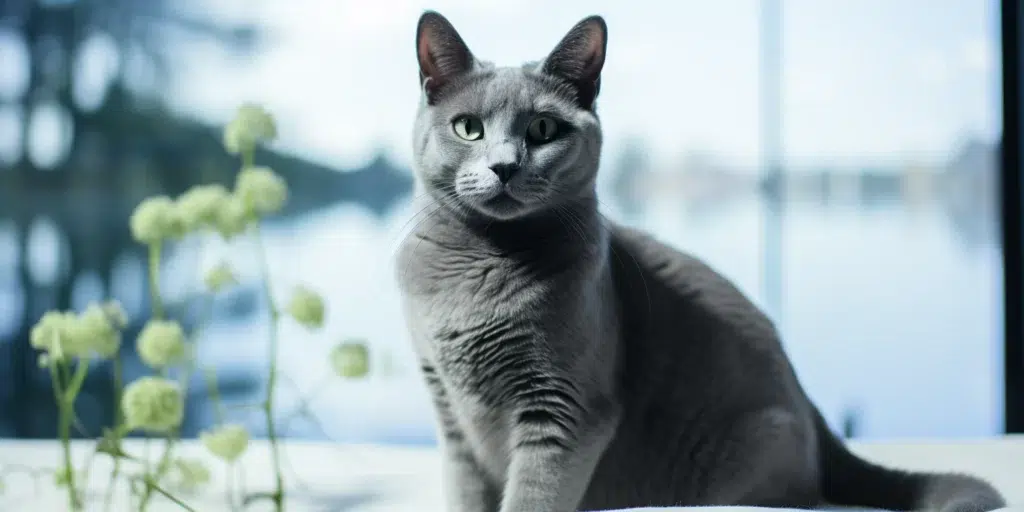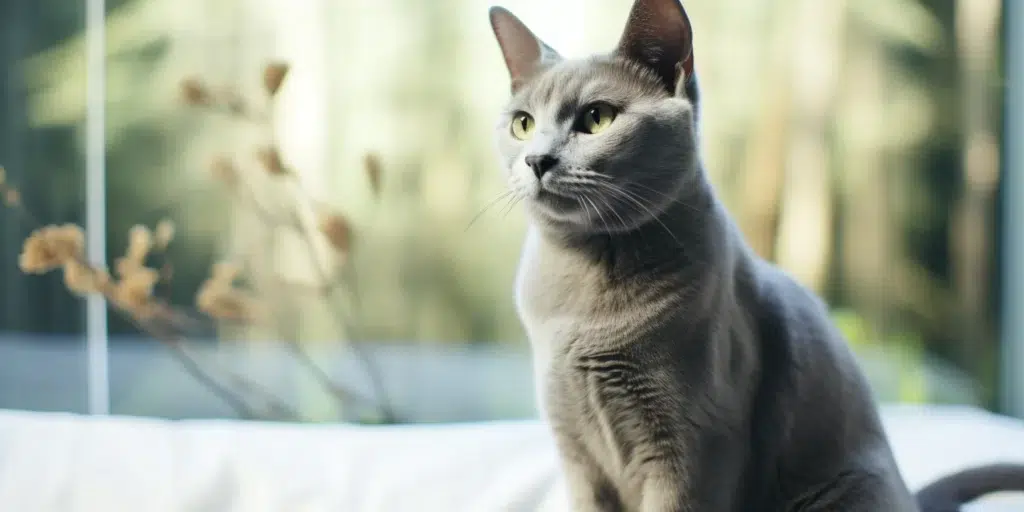Have you ever wondered if Russian Blue cats are the kind of furry friends who talk back? If you’re thinking of bringing a Russian Blue cat into your home, or if you’re just curious about what makes these elegant felines tick, you’re in the right place!
Today, we’re diving into the world of Russian Blue cat vocalizations. These cats aren’t just known for their stunning silvery-blue fur and bright green eyes—they also have a unique way of communicating that can be both fascinating and heartwarming.
Understanding the sounds your Russian Blue makes is key to building a strong bond with your pet. Whether they’re meowing, purring, or making any other kind of noise, each sound has a special meaning.
So, let’s get into the world of Russian Blue cats and their vocal habits to see how talkative they really are.

Are Russian Blue Cats Vocal?
Yes, Russian Blue cats can be vocal when their needs are not fulfilled. These elegant felines have a gentle and somewhat reserved nature, but that doesn’t mean they don’t have their own unique ways of expressing themselves.
Gender can sometimes play a role in how vocal a Russian Blue might be. Males and females can have differing levels of chattiness, though it’s more about individual personality than gender.
Some Russian Blue cats might frequently share their thoughts, while others prefer to ‘speak’ only when they have something important to say. This variation adds to the charm of getting to know your own Russian Blue’s personal ‘voice’.
Factors That Influence Russian Blue Cat Noise Levels
It’s also noticed that the activity and exercise levels of a Russian Blue can affect their noise level. These cats are moderately active. They enjoy playful moments but also cherish their relaxation time.
A well-exercised Russian Blue is usually content and less inclined to vocalize, except perhaps to remind you it’s time for dinner or a cuddle session.
Their Age
Age is a significant factor in how vocal a Russian Blue cat may be. Kittens are naturally more vocal, using meows and yips to communicate their needs and explore their surroundings.
As Russian Blue cats grow into adulthood, they often mellow out, becoming more reserved and less inclined to make noise without a good reason.
It’s during these early months that they learn the effectiveness of their vocalizations. For instance, a kitten quickly learns that a certain meow may result in food, attention, or play. As they age, they carry these lessons forward, but may vocalize less as they become more independent and self-assured.
Senior Russian Blue cats might become more vocal again, this time due to different needs. They may require more attention, have specific dietary requirements, or face health challenges that cause them to communicate more frequently.
It’s important to pay attention to changes in vocalization as they age.

Feeding Russian Blue Cats and Its Relation to Noise Levels
Mealtime is a prime time for Russian Blue cats to get vocal. They might remind you of feeding times with a polite meow or an insistent purr, especially if they’re on a routine and you’re running late. Their intelligence and memory mean they’re quite good at keeping track of when food should be arriving.
On the flip side, overly vocal behavior around feeding time could indicate that your furry friend is either not getting enough food or isn’t satisfied with what they’re getting. It’s essential to consult with a vet to ensure their diet is fulfilling their nutritional needs, which might help reduce excessive meows around the food bowl.
Interestingly, how you respond to their vocalizations about food can teach them what works. If meowing earns them an extra treat, they’ll remember that strategy. Balancing their dietary needs while not encouraging too much noise requires a bit of finesse.
Exercise Can Affects Their Noise Levels
Physical activity has a direct impact on how vocal your Russian Blue cat might be. A well-exercised cat is typically a happy, content cat. Engaging play sessions that mimic hunting behaviors, like chasing or jumping, can help meet their activity needs, leading to a more serene and quieter feline friend at home.
Lack of exercise, however, can result in a vocally frustrated cat. Just like humans get a bit cranky when cooped up too long, your Russian Blue might express its dissatisfaction with increased meowing or other vocal sounds. Regular playtime isn’t just good for their physical health but their vocal happiness too.
Moreover, mentally stimulating toys and activities can help keep their noise levels down. Russian Blues are intelligent, so puzzles and toys that challenge their brain will keep them engaged and less likely to resort to vocalizing from boredom.

Medical Conditions
Sometimes, increased vocalization in Russian Blue cats can signal a health issue. It’s their way of letting you know something isn’t right. Conditions affecting their well-being, from dental pain to more serious internal issues, could lead to a chattier cat.
Regular vet check-ups are essential to catch any health problems early. If your usually quiet Russian Blue starts making more noise than usual, it’s a good idea to consult your vet. Sometimes, the only sign of discomfort in cats can be a change in their vocal habits.
Understanding their baseline noise level—how vocal they are normally—can help you notice when things change. It’s essential to pay attention to what might be behind a sudden increase in noise, as early detection can make all the difference in treatment and outcomes.
Russian Blue Cat Noises and Their Meaning
Understanding the different noises your Russian Blue makes can significantly enhance your relationship.
Cats communicate for various reasons, and by tuning into their vocal cues, you can better meet their needs and strengthen your bond.
Meow (The Most Common Noise)
The meow is a foundational sound in the Russian Blue’s vocal repertoire, used primarily to communicate with humans. From a gentle greeting meow to a demanding “it’s time for dinner” call, each variation has a unique meaning.
For Russian Blues, meowing can be a sign of affection, a request for attention, or a way to express their needs and desires.
Purring (The Most Enjoyable Cat Noise)
The purr of a Russian Blue is music to a cat lover’s ears. Purring is usually a sign of contentment but can also be a way for your cat to comfort itself when it’s not feeling well.
The reason it’s so enjoyable is that it often indicates your feline friend feels safe and happy in your company—a sign of mutual affection and trust.

Hissing (Your Cat Feels In Danger)
Hissing is a defensive noise, signaling fear, aggression, or discomfort. If your Russian Blue hisses, it’s time to step back and assess the situation.
They might feel threatened or be in pain. Understanding this can help prevent escalating stress or potential danger to both you and your cat.
Yowl (Not a Happy Meow)
Yowling or loud meowing can be a sign of distress, discomfort, or even territorial disputes with other cats.
If your Russian Blue yowls, they’re trying to tell you something important. It’s crucial to pay attention and seek to understand the underlying cause.
Growls (Not as Scary as a Tiger)
Growling in Russian Blue cats is a clear warning signal. They might be annoyed, scared, or feeling threatened. Respecting their space and seeking to eliminate the source of their discomfort can help calm them down.
Some Cats are More Talkative Than Others
Personality plays a big part in how vocal a Russian Blue cat can be. While the breed is known for being more on the quiet side, individual cats may have much to say. Recognizing and appreciating your cat’s unique communication style strengthens your bond.

How to make Russian Blue Cats less vocal?
If you find your Russian Blue cat is too vocal, consider their exercise needs, the regularity of their routine, and the amount of attention they’re receiving.
These factors can influence their vocalizations. Providing mental and physical stimulation can help keep them quieter.
Conclusion
Russian Blue cats may not be the chattiest felines in the cat world, but they communicate in meaningful ways. Understanding their vocalizations can deepen your connection, making for a harmonious and loving relationship with your four-legged friend.